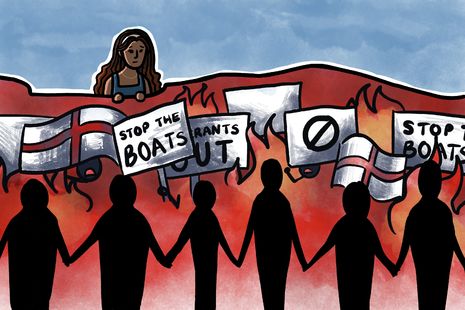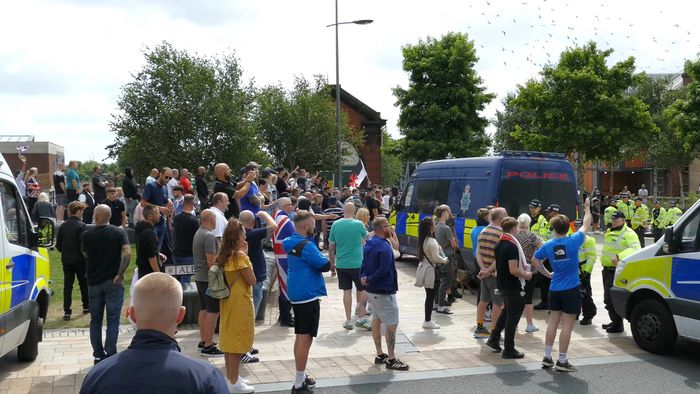The riots shouldn’t have come as a surprise – at least, not to the Tories
Fatima Zahra Yusuf returns to her column ‘Fatima’s Fieldnotes’ to examine the worrying root causes of last month’s rioting

The recent riots that erupted across several English cities have shocked many. But, for those paying close attention to the sociopolitical climate in the UK over the past few years, these events were a long time coming.
The tragic deaths of Bebe King, Elsie Dot Stancombe, and Alice Dasilva Aguiar in Southport on July 29 ignited unrest that soon spread across the country. However, these riots were not characterised by peaceful memorial gatherings or solemn recognition of the victims. Instead, they became an avenue for certain groups to express hostility towards communities of colour. The unrest was fuelled by the rapid spread of misinformation on social media, falsely claiming the suspect was a Muslim asylum seeker who had arrived in the UK by boat. The riots thus deviated far from any genuine attempt to honour the young victims, instead becoming a manifestation of pre-existing racial tensions and an opportunity for some to target minority communities based on false information.
Behind all of this is a Conservative government that many believe has blood on its hands. Its language is at least partly responsible for the divisions we are seeing today. As horrifying as these riots were, I wasn’t the least bit surprised. What else should we expect from the legacy of a party that’s consistently scapegoated asylum seekers for its own failures?
“As horrifying as these riots were, I wasn’t the least bit surprised”
The Conservative Party’s “Stop the Boats” slogan, first popularised in 2022, has become a cornerstone of their immigration policy. Now, it was shouted during unrest where many involved are now convicted of violent disorder. On the surface, it appears to address concerns about illegal channel crossings. However, its simplicity belies a more insidious effect: the demonisation and dehumanisation of asylum seekers and immigrants as a whole. It is this simplistic yet potent rallying cry that has had far-reaching and dangerous consequences.
But, more importantly, save the tears. Why are politicians—particularly those on the right—so quick to offer hollow words of support for those affected by the riots, when they erupted due to their own actions? These riots didn’t happen in a vacuum. They are the direct result of years of demonising immigrants and asylum seekers with inflammatory rhetoric and hostile policies stoking public anger. When the government fans the flames of division, we shouldn’t be shocked when communities reach their breaking point.
In an era of social media, misinformation spreads like wildfire. According to a 2024 report conducted by the Alan Turing Institute, more than 9 in 10 people (94%) in the UK have reported witnessing misinformation on social media. This digital ecosystem has allowed baseless rumours and exaggerated claims about immigrants to flourish unchecked.
One particularly that gained traction was the idea that asylum seekers were being given the same treatment in housing and benefits as Brits. A poll by YouGov found that 26% of Britons believed this falsehood, despite clear evidence to the contrary. Such misconceptions have fuelled resentment and anger, particularly in economically disadvantaged areas where resources have already been underfunded.
The disproportionate focus on “boat people” has created a distorted perception of the immigration landscape. Yet, Home Office statistics show that channel crossings represent only a small fraction of overall immigration to the UK. In 2022, approximately 45,000 people crossed the Channel in small boats, compared to over 1.1 million visas granted for work, study, or family reasons.
“Political leaders who stoke fears about immigration for short-term gain are playing with fire”
To say that these riots were unexpected is to ignore the warning signs that have been flashing for years. Less than a decade earlier, then Home Secretary Theresa May introduced a series of immigration policies dubbed the “hostile environment”. It seems she has succeeded. Her and the government’s language gave rioters the green light to take up responsibility for what “hostile” meant.
The riots are not just about immigration, or any single issue. They are the result of a perfect storm of factors: economic inequality, political polarisation, the erosion of trust in institutions and the weaponisation of identity politics. The “Stop the Boats” slogan and associated policies have acted as a lightning rod, focusing diffuse anger and frustration onto a visible and vulnerable target.
Political leaders who stoke fears about immigration for short-term gain are playing with fire – and some people are picking up the torch quite literally. One of the men jailed for inciting violence on social media called for a hotel housing asylum seekers to be set on fire.
While some people may be shocked at these riots, I want to make it clear that they were not an isolated incident but rather the culmination of years of growing anti-immigrant sentiment fuelled by inflammatory rhetoric. We shouldn’t be shocked by these events because the warning signs have long been present. The riots serve as a stark reminder that words have consequences, and that scapegoating minority groups can lead to very real and destructive outcomes.
 Comment / The (Dys)functions of student politics at Cambridge19 January 2026
Comment / The (Dys)functions of student politics at Cambridge19 January 2026 Arts / Exploring Cambridge’s modernist architecture20 January 2026
Arts / Exploring Cambridge’s modernist architecture20 January 2026 Theatre / The ETG’s Comedy of Errors is flawless21 January 2026
Theatre / The ETG’s Comedy of Errors is flawless21 January 2026 Features / Exploring Cambridge’s past, present, and future18 January 2026
Features / Exploring Cambridge’s past, present, and future18 January 2026 News / Local business in trademark battle with Uni over use of ‘Cambridge’17 January 2026
News / Local business in trademark battle with Uni over use of ‘Cambridge’17 January 2026










